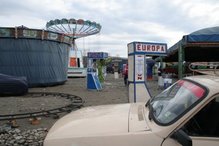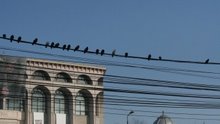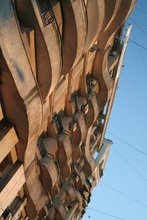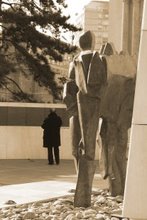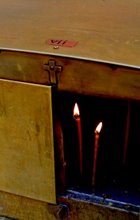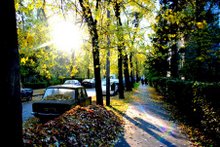For about four years, I’ve had a problem with my thyroid. Before that, I didn’t even know I had anything with such an ugly name in my body. It is a gland located in the neck, and in close interaction with the hypothalamus and with other glands. The thyroid, like any gland that respects itself, releases hormones. Hormones (the word comes from Greek horman ‘to impel, to set in motion’) act as regulatory substances and are transported in tissue fluids such as blood or sap to stimulate specific cells or tissues into action. Hormonal systems are very complex, but this is as much as I have understood. The thyroid regulates the body’s metabolism very broadly. When shocked due to environmental or emotional factors, my thyroid reacts by becoming infected. Because this is a very sensitive thing, afterwards the full working capacity is reduced, because the infection has permanently damaged some of the tissue. This has happened a few times now, and I keep thinking that my metabolism gets slower and slower and I am turning into a turtle-shell.
When I went to my host to ask her advice about me seeing a specialist about my thyroid and cholesterol problems in Bucharest, she said to me, yes this is a good clinic, and yes, I will put in a word with my friend so you get an appointment with full attention (Romanian style). Thank you. But, she said, I will also offer my opinion. I don’t think you should solve this problem with medication. What you really need is to find your place in your life, settle down, found a family and until you don’t do that, your body is going to continue being haywire. You need to find a man and learn to be tolerant with them. This will make you happy. I found myself in full agreement with her, silently listening and nodding. Anyone heard of a hormone that sets this process in motion…?!?
Saturday, 30 June 2007
Anthropologie, rhétorique et limitations du milieu ambiant
L’individu incertain (1995) d’Alain Ehrenberg est un ouvrage dont la thèse centrale soutient que la responsabilité accrue exigée de l’individu contemporain représente à la fois une libération aussi bien qu’un fardeau. L’auteur soutient que, pour alléger ce poids et pour faciliter les capacités d’agir nos sociétés offrent les possibilités suivantes. Il distingue entre moyens d’action sur soi de la pharmacologie (drogues licites et illicites, anxiolytiques, antidépresseurs), et entre les mises en scène de soi des technologies de la communication (interactivité, reality-shows, cyberespace).
C’est un ouvrage qui s’inscrit dans le même champ d’intérêts que d’autres publications qu’a réalisées Ehrenberg (ouvrages qui incluent les enjeux plus larges, notamment Le culte de la performance qui traite le sport dans la « société contemporaine », La fatigue d’être soi portant sur la dépression, ainsi qu’une série d’ouvrages qu’il a dirigés portant sur la maladie mentale et la consommation de drogues). L’ouvrage perpétue, malheureusement, quelques-unes des faiblesses des autres livres-Ehrenberg. L’Individu incertain n’arrive pas à sortir du domaine théorique, et, par conséquence, présente trop peu de liens réels entre l’argument et des études de cas. Bien que son orientation se veut sociologique, il relève plutôt du domaine de la philosophie. Il cherche à s’inspirer de démarches anthropologiques, dont il qualifie néanmoins les instruments d’enquête inadéquates et inadaptées pour l’étude de ‘collectivités… bien entendu trop grandes et trop complexes’ (p.27). Dommage que les sociologues et les anthropologues ne cherchent toujours pas à vraiment à se comprendre mutuellement et d’apprendre les uns des autres…
Pour moi, portant volontiers mon fardeau ( ?) d’éducation anglo-saxonne, l’argument académique à la française, si vous me permettez un peu de caricature, m’embête, ressemblant, trop souvent, à un marmonnement soutenu, gonflé de généralisations exagérées qui perdent toute signification en cours de route. Souvent sous-tendu, une arrogance latente mais persistante qui surgit dans des interjections telles que ‘bien entendu, il n’en est pas ainsi…’ et dans des formulations qui ne sont pas destinées à jeter une lumière nouvelle sur un argument, mais à faire allusion à la culture générale e-x-t-r-a-o-r-d-i-n-a-i-r-e de son auteur. Si ces jeux rhétoriques resurgissent trop souvent, je me fâche. Le génie réel ne dépend pas de publicité (voir littératures, poésie de première classe, par exemple…). Je me souviens de ces modèles atomiques, au cours de chimie au lycée, qui faisaient référence à des « nuages électroniques » un flou indéterminé qui correspond à la situation des électrons à un moment donnée. Je vois devant moi un professeur qui tient un discours à un institut académique français quelconque et j’écoute, sans pouvoir cerner vraiment à quoi bon toutes ces gesticulations, tout ce brouhaha et tout cet indéterminisme. Allez – qu’on prenne le chat par la queue, qu’on arrête de circuler comme des lâches autour du Bräi (voilà les luxembourgismes tant attendus !). Ce qui ne revient pas à dire qu’il faut succomber à un populisme souvent senti dans l’espace académique anglo-saxon. Je ne soutiens non plus que « vulgarisation » et « populisme » sont identiques. Il revient à admettre que, mon habitus (voilà encore un terme à perdre beaucoup de temps de discussion – un autre jour si vous insistez) engendre des difficultés à cerner et à bien comprendre la structure des arguments en français. Ils manquent de densité et qu’ils ne répondent pas aux enchaînements rhétoriques attendus, tout en présentant souvent un excès de zèle stylistique ainsi que cette propriété qui me suffoque tel un milieu ambiant rempli d’ouate, d’une viscosité encombrante.
Or, vu son originalité d’approche et d’analyse, il faut voir plus loin que ces faiblesses largement dues à l’enracinement de l’auteur dans un milieu académique français. Ehrenberg sait inspirer et il fait preuve d’une intuition fantastique de « vérité scientifique ». Avec son flou habituel, il trouve le moyen de condenser, dans une toute petite phrase banale, ce que les anthropologues peinent à voir uniquement après de longues périodes de terrain, d’innombrables interviews et un nombre hallucinant de cafés pris ensemble avec les gens. Il dit ainsi, en conclusion :
« parce que nous nous appuyons de plus en plus sur nos ressorts internes, elle [la politique] est la condition pour ne pas être prisonnier d’une subjectivité dont les deux risques sont l’apathie dépressive qui multiplie les risques d’autodestruction, et la non-limitation des rapports de force qui rouvre grande la porte à toutes les dominations des forts sur les faibles et à toutes les violences qui peuvent en découler. Le manque de politique dans une démocratie avancée, c’est le risque d’implosion par le bas. »
La manière de procéder des anthropologues (ces populistes en herbe ?!) est inverse. Elle part d’un tel constat et le traite comme une boîte noire. On l’ouvre pour voir ce qu’il signifie lorsqu’il est mis en rapport réel avec la vie de tous les jours des Hommes, ou, plus exactement, les habitants d’une certaine localité située dans tel et tel pays dans une telle conjonction économique, politique, sociale, religieuse, et à un tel moment de l’histoire. C’est une question d’instances spécifiques, de détails, de commentaires assez peu réflexifs et très réflexifs, de rapports sociaux concrets. A l’horizon, cependant, on n’oublie jamais que ces personnes avec qui ces anthropologues travaillent sont aussi des Hommes, surtout dans leurs rapports réciproques. Qu’en pensez-vous ?
C’est un ouvrage qui s’inscrit dans le même champ d’intérêts que d’autres publications qu’a réalisées Ehrenberg (ouvrages qui incluent les enjeux plus larges, notamment Le culte de la performance qui traite le sport dans la « société contemporaine », La fatigue d’être soi portant sur la dépression, ainsi qu’une série d’ouvrages qu’il a dirigés portant sur la maladie mentale et la consommation de drogues). L’ouvrage perpétue, malheureusement, quelques-unes des faiblesses des autres livres-Ehrenberg. L’Individu incertain n’arrive pas à sortir du domaine théorique, et, par conséquence, présente trop peu de liens réels entre l’argument et des études de cas. Bien que son orientation se veut sociologique, il relève plutôt du domaine de la philosophie. Il cherche à s’inspirer de démarches anthropologiques, dont il qualifie néanmoins les instruments d’enquête inadéquates et inadaptées pour l’étude de ‘collectivités… bien entendu trop grandes et trop complexes’ (p.27). Dommage que les sociologues et les anthropologues ne cherchent toujours pas à vraiment à se comprendre mutuellement et d’apprendre les uns des autres…
Pour moi, portant volontiers mon fardeau ( ?) d’éducation anglo-saxonne, l’argument académique à la française, si vous me permettez un peu de caricature, m’embête, ressemblant, trop souvent, à un marmonnement soutenu, gonflé de généralisations exagérées qui perdent toute signification en cours de route. Souvent sous-tendu, une arrogance latente mais persistante qui surgit dans des interjections telles que ‘bien entendu, il n’en est pas ainsi…’ et dans des formulations qui ne sont pas destinées à jeter une lumière nouvelle sur un argument, mais à faire allusion à la culture générale e-x-t-r-a-o-r-d-i-n-a-i-r-e de son auteur. Si ces jeux rhétoriques resurgissent trop souvent, je me fâche. Le génie réel ne dépend pas de publicité (voir littératures, poésie de première classe, par exemple…). Je me souviens de ces modèles atomiques, au cours de chimie au lycée, qui faisaient référence à des « nuages électroniques » un flou indéterminé qui correspond à la situation des électrons à un moment donnée. Je vois devant moi un professeur qui tient un discours à un institut académique français quelconque et j’écoute, sans pouvoir cerner vraiment à quoi bon toutes ces gesticulations, tout ce brouhaha et tout cet indéterminisme. Allez – qu’on prenne le chat par la queue, qu’on arrête de circuler comme des lâches autour du Bräi (voilà les luxembourgismes tant attendus !). Ce qui ne revient pas à dire qu’il faut succomber à un populisme souvent senti dans l’espace académique anglo-saxon. Je ne soutiens non plus que « vulgarisation » et « populisme » sont identiques. Il revient à admettre que, mon habitus (voilà encore un terme à perdre beaucoup de temps de discussion – un autre jour si vous insistez) engendre des difficultés à cerner et à bien comprendre la structure des arguments en français. Ils manquent de densité et qu’ils ne répondent pas aux enchaînements rhétoriques attendus, tout en présentant souvent un excès de zèle stylistique ainsi que cette propriété qui me suffoque tel un milieu ambiant rempli d’ouate, d’une viscosité encombrante.
Or, vu son originalité d’approche et d’analyse, il faut voir plus loin que ces faiblesses largement dues à l’enracinement de l’auteur dans un milieu académique français. Ehrenberg sait inspirer et il fait preuve d’une intuition fantastique de « vérité scientifique ». Avec son flou habituel, il trouve le moyen de condenser, dans une toute petite phrase banale, ce que les anthropologues peinent à voir uniquement après de longues périodes de terrain, d’innombrables interviews et un nombre hallucinant de cafés pris ensemble avec les gens. Il dit ainsi, en conclusion :
« parce que nous nous appuyons de plus en plus sur nos ressorts internes, elle [la politique] est la condition pour ne pas être prisonnier d’une subjectivité dont les deux risques sont l’apathie dépressive qui multiplie les risques d’autodestruction, et la non-limitation des rapports de force qui rouvre grande la porte à toutes les dominations des forts sur les faibles et à toutes les violences qui peuvent en découler. Le manque de politique dans une démocratie avancée, c’est le risque d’implosion par le bas. »
La manière de procéder des anthropologues (ces populistes en herbe ?!) est inverse. Elle part d’un tel constat et le traite comme une boîte noire. On l’ouvre pour voir ce qu’il signifie lorsqu’il est mis en rapport réel avec la vie de tous les jours des Hommes, ou, plus exactement, les habitants d’une certaine localité située dans tel et tel pays dans une telle conjonction économique, politique, sociale, religieuse, et à un tel moment de l’histoire. C’est une question d’instances spécifiques, de détails, de commentaires assez peu réflexifs et très réflexifs, de rapports sociaux concrets. A l’horizon, cependant, on n’oublie jamais que ces personnes avec qui ces anthropologues travaillent sont aussi des Hommes, surtout dans leurs rapports réciproques. Qu’en pensez-vous ?
Saturday, 23 June 2007
LÈif Matbierger vun Lucilinburhuc,

Once upon a time in 963, one guy exchanged some properties in Germany for a small rocky place in the heart of Europe: Lucilinburhuc, the little castle. 1044 years later, we’ve come a long way…
On the occasion of a purely conventional Groussh‰erzogsgebuertsdag, your arguably most unpatriotic Lux representative, her Silliness Nutshell-in-exile, would like to say a few words. The upside is that my speech will not be delivered in Luxembourgish with a French accent, but in English with a Luxembourgish accent.
What do I miss about Luxembourg? Of course, all those dear persons that I call my friends and family - but this is hardly the place to reminisce about such personal matters. My J’accuse does not exclude me, for I am not free of influence of the place I have grown up in.
I miss its hills, the lake, and EislÈk more generally, the Belgian border at Colpach, its farm houses, its chapels along the road, its cleanliness, its city walls and high cliffs, its castles and secret passages. It is a place full of different languages, reservation and Muttergottesstatuen. My dreams about it are filled with winding roads and cow stables. It is a beautiful place, like a village with too much money, blown up out of proportion. It has suffocating elements that provoke migraines and bursts of anger in me. It rests on a conservative mentality that screams ‘mir wÎlle bleiwe…’ and on citizens who accusingly point fingers ‘quo vadis…’ in stylistically awful / rhetorically inane, often content-free Briefe and die Redaktion. Luxembourgers abroad tend to complain about running taps, soft mattresses, and food that is inadequate for their bowels. They miss their daily dose of obituaries (the country is so small all of those can be put on a few pages of newspaper) and work out the cause of death from the wording of the announcement. Marriage and birth announcements are studied in detail, with extensive excursions of kinship and place ‘oh look, isn’t this the nephew of Muller from Siewebueren, on the mother’s side, you know the one who worked at the Schmeltz for a while and then had this car accident with Wampach from Wecker, he has a child with the Eller widow’s daughter’. Our territory was made smaller in the mid nineteenth century, but we were transformed from being a Duchy to being a Grand-Duchy. That was our consolation, and has left us with a Fuerz am Kapp. We are marked by being occupied twice in the wars of the twentieth century. We are not German, we say, grinding our teeth, just before adding that we are not nationalist. We really took the post-war welfare state seriously. Steel industry was ours before Mittal’s time. The country’s post-industrial state of wealth is reflected in its prettier-than-fairytale urban spaces: impressive museums with a lot of marble, paved plazas, renovated mansions, flowers planted in subtle arrangements of to-the-millimetre exactitude, sanitised, every microbe removed. The property prices in the city do not add to the liveliness of the place, as your average person cannot afford to live here, not even in the smallest of cupboards. The Pafendall is the place I would choose to live in, had I unlimited funds and patience (natiirlich och wÈinst dem Numm). Architectural wonders of centuries of occupation: Vauban, the Spanish, the Austro-Hungarians and Pei (more recently) have left traces. I walk down Grand’-rue with ever changing upper crest boutiques that add to the flavour of wealth. Identities made and remade in a frenzy through consumption goods and luxury articles: cars, jewelry, upmarket restaurants, cosmetics, culture. I walk on and count the banks. Geld stÈnkt nit, they say. I walk on past William the Second of the Netherlands, the only Dutch ruler who bothered to visit his Luxembourgish colony. Full of gratefulness we made him a statue. I can smell the earth of the flowers of the market, as they watered them in the morning breeze. I buy some vegetables. Markets for city people, once a week. I walk down past our national fox, Renert, who sits, head bowed (?), listening to the chimes of the cathedral. The beautiful empty cathedral of ours: Maryland how I love thee. Note to self: buy a black party card one of these days, just for the hell of it. The boulevard Roosevelt, rich of symbols, and entrance to one set of the underground casemates that smell like urine and mould. I nod in direction of the public service canteen (another convent converted) and walk past Disneyland meets Hellege Geescht (crimes of an urbanist nature are also committed in the Grand-Duchy…). In hiding a view of the Gronn that is one of my favourites and that shows the converted male and female prisons where detainees used to glue bags (a detail that fascinated me as a child…), and a convent that is beautifully renovated and now hosts cultural events. I return to the boulevard and cross that bridge (having come to it) that spans across lush green depths of park valley where the Alzette and the PÈtrusse flow. God built his church on a rock and called it Luxembourg. The quartier Gare has a more lively mix of architecture, but you need to look up. Here, too, the same boring shops that you find in any European city now have taken over. The Fischer-mafia has sucked up most of the bakeries (but in Biekerich remains, without exaggeration, the best baker in the world… I would give a lot for one of his frangipanes now, too bad I have high cholesterol…), but Journal cafÈ has remained. There is little interaction in the city, people live far from each other, but not in distance. Nothing touches me is the curse, reversed, that I carry with myself: everything touches me. Every now and then you run into someone who is the opposite. The smallness makes that people consider that half an hour’s drive is far away. Everything is small: the train station, the airport, the Autobunnopfaarten, my village. My village, Redange-les-Bains (well, we have a river originating in the Ardennes…) has, among other things less remarkable, a Kropemann, a Cactus, a water reservoir that looks like a Roman villa, and a swimming pool that has much changed since I was a kid. I want to go back to the time I enjoyed playing in the local Harmonie, and when I helped organise scouts for kids on the weekends. I longed to leave even then. When or if I return I will remember how privileged the place is I grew up in, and fight against attitudes of pettiness, envy, delusions of grandeur, and nagging that sometimes take it over. Maryland mon amour – Smallville ma peine – vive de Grand-duc, vive d’Grand-duchesse... Et kinnt een hei theoretesch nach Leit derbeiflÈcken mat deene LÎtzebuerg sech bretzt: vive de Victor Hugo, vive de SchanKloot, vive de Robert Schumann, vive de Generol Patton, vive de Superjhemp, etc. mee et ass e wÈinich pÈnibel… allez, vive LÎtzebuerg!
Wednesday, 20 June 2007
Taking Care
I met this beautiful eighty-year-old woman. It had been her birthday the day before. She lives in a two-bedroom house with a terrace, and some painted outside walls. She has a well and a garden that she still works in. The strawberries were twinkling between the green leaves, and the orange fire flowers had grown almost a metre high. She told me how her husband had died thirty years ago, and how life now was not good anymore, because she could not do anything anymore. Take no decisions and not enough action. She was showing me all her crafted blankets, of wool, and cotton, and the costumes she had sewn. She told me her daughter was unhappy about her wearing torn jumpers, because she did not understand what she was keeping the good clothes for. She did not want to dress up because she did not leave the house. Her loom showed a piece of cloth in the making that was white, with the occasional stripe pattern. She was working on the finely-grained cotton towels that are used on the occasion of orthodox burials. She was not angry at her life, or bitter, but when it would be time for her to leave, she would be ready.
Saturday, 16 June 2007
302
That’s the number which has woken me up. It stands for the total cholesterol levels in my blood. Cholesterol (C 27 H 45 OH) is a compound of the sterol type found in most body tissues, including the blood and the nerves. Cholesterol and its derivatives are important constituents of cell membranes and precursors of other steroid compounds, but high concentrations in the blood (mainly derived from animal fats in the diet) are thought to promote arteriosclerosis. My cholesterol levels are double of the maximum it should be, despite a diet that is relatively low in animal fats, and despite moving about quite a lot. The price to pay for the stress of the phd? It means I will try to be a vegan for a while, and see what that changes. It worries me a bit, but it is strange how a number like that tells you about what happens inside your body. I feel angry about how this body of mine, that, since my early twenties, has been letting me down repeatedly. I am not sure what this cholesterol implies, but I have so many plans in my life that I need to pay heed to it...
Monday, 11 June 2007
Place and Season

I have left to Bucharest for a week. Upon leaving I find myself looking at everything again, in the hope to remember everything, should I not return. As much as I want to leave at times, I have grown very attached to the place. One woman told me that she was like salcam, that she could put her roots anywhere and feel well. I wonder to what extent that is true for me?
The lushness of those trees and all the climbing plants on the houses make me want to have very special drawing abilities that could capture all the windings and shadings and colour shades perfectly. They even have vines, despite the altitude at which we are. I am forever amazed by the way in which seasonality still makes sense in the village I have now been staying at for about four months. The products correspond to certain times. Winter was the time of nuts and onions and cabbage. We had salcam honey, then the apple trees started to flower. Now soc is in bloom, and people prepare a kind of pancakes with these flowers that I find absolutely gorgeous. The garden is full of salad, spring onions and the tomatoes are starting to grow. The prune trees are full of little green bulbs that stick into the air. While I got more cascaval in early spring, now I get strawberry jam and honey. Soon we'll have cherries, and I cannot wait...
Thursday, 7 June 2007
Unfolding
"It is the direction that decides whether we are being released from the centre in a movement that is ever freer or whether we are becoming more and more attached to a centre that will ultimately destroy us: the question means nothing less than life and death".This is what Paul Klee had to say about the spiral. We are developing in ways that cannot be reduced to the point of origin. Time is a creative force in itself and sweeps through us, and we love and leave and werkeln and build and pray and hope and sing and feel our way through the dark patches of the sun.
What, they asked again, for the umptieth time, does it take for love to remain? You are drawn to each other, strangers, and yet you can recognise their humanity in an instant. You may have grown up differently, with different values, religions, interests, tastes, preferences, priorities. You can tell kindness. You can feel truthfulness, groundedness, lightness in the palms of their hands. The petals can poison you just as they can make you whole. You discover patches of each other, you talk, you disagree and get upset, you find the common ground back, you laugh, you are touched, moved, rocked, spiralling into attraction of a different kind. You take risks with willingness and eagerness and impatience. You wait for the other because they have filled your soul with crystals of honey. You learn how to make compromises, and to understand what the other one is saying, not just what you thought you wanted to hear. You learn to live with what you thought you could never accept. Things take time. That’s love.
I have been able to let go a bit of my tightly structured actions and started to enjoy living here. It is easier with the summer. The trouble is that this way of being makes me wonder how much of pulling-together and disciplining-to-the-extremes it takes to get the phd done, and how much I am allowed to live. It is thoroughly enjoyable though to swing with the rhythms that surround me rather than being in full dissonance following those rhythms not grounded in the present landscape. So I will dance a bit more. Let us see how long I can get away with it. kitty-gritty
What, they asked again, for the umptieth time, does it take for love to remain? You are drawn to each other, strangers, and yet you can recognise their humanity in an instant. You may have grown up differently, with different values, religions, interests, tastes, preferences, priorities. You can tell kindness. You can feel truthfulness, groundedness, lightness in the palms of their hands. The petals can poison you just as they can make you whole. You discover patches of each other, you talk, you disagree and get upset, you find the common ground back, you laugh, you are touched, moved, rocked, spiralling into attraction of a different kind. You take risks with willingness and eagerness and impatience. You wait for the other because they have filled your soul with crystals of honey. You learn how to make compromises, and to understand what the other one is saying, not just what you thought you wanted to hear. You learn to live with what you thought you could never accept. Things take time. That’s love.
I have been able to let go a bit of my tightly structured actions and started to enjoy living here. It is easier with the summer. The trouble is that this way of being makes me wonder how much of pulling-together and disciplining-to-the-extremes it takes to get the phd done, and how much I am allowed to live. It is thoroughly enjoyable though to swing with the rhythms that surround me rather than being in full dissonance following those rhythms not grounded in the present landscape. So I will dance a bit more. Let us see how long I can get away with it. kitty-gritty
O Lume Minunata


What comes to mind when you see this kitchen? What does it do to your imagination? How would it be a different experience if you had been in the kitchen, met the woman in the picture, smelled the food she was preparing and heard the rain coming down the mountains? How would it be the same? What features did you concentrate on and what memories did they recall for you? How would it feel if you had lived there all your adult life? What about childhood? The reconciliation of worlds, even if just for a moment, happens all the time. That is the most important lesson I learnt ever so recently.
Angels

I know that really they’re people. They appear and offer their help. They show me kindness. They make my cynical self blush and hide in a corner. They are genuinely interested. They say hello to me on the street. They tell me about their own encounters with strangers. They take me with them to the mountains to relax. They restore my suflet. They give me strength. They make me speak about what I feel and ease my homesickness. They make me laugh and dance. They make everything worthwhile.
Toes
I hit my little right toe against a wooden object that jumped into my way. Yes, it is the same toe that greatly handicapped me during the first months of my Masters year, causing some people only to inquire about the wellbeing of my toe (pars pro toto). However, it is not quite as bad, I think, the coloration is (as yet) not quite as extensive and beautifully blue… though it made me think about this particular toe that I had completely forgotten about for the last year and a half. I think our feet are not well designed. I think they should be much tougher, like horse hooves, so we could walk barefoot and not have a problem. It would serve a lot of different purposes. Even saying, I will give you a kick in the a*** would have entirely different connotations (I abhor violence). You could step on cow’s hooves, for a change. Pedicure would be interesting, so would football. I am afraid Pike Aer would also be around in this kind of world with these kinds of feet, offering tattoos for hooves, feet-painting and all kinds of cushiony stuff to fix below the hoof to improve jumping power. It would also be good for insulation, and I think one could have reduced the problem of cold feet, wet socks and ensuing pneumonia and fever. Now I am a limp-shell, slightly slower, but still moving, hopefully.
Subscribe to:
Posts (Atom)






